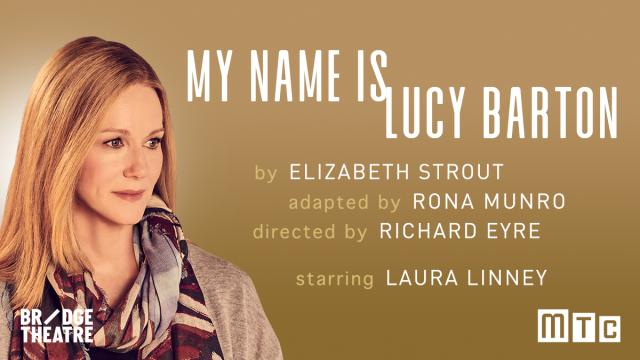

Adapting a novel to the stage is a tricky business. A play needs to have a central action executed within a playing time of a few hours, while a novel can be a rumination on multiple themes over hundreds of pages. Even a short novel can dive into a character’s interior in a way a play can not. Theater is action, literature is thought. My Name Is Lucy Barton, Rona Munro’s stage version of Elizabeth Strout’s slim but powerful novel now presented by Manhattan Theater Club after a run in London, manages to combine the two strains in a moving evening featuring the luminous Laura Linney in a stunning solo—yet dual— performance.
Strout’s fiction, including the Pulitzer Prize winning “Olive Kittredge, focuses on the unspoken and missed connections between family members, friends, and lovers, usually from rural small towns. There isn’t much in the way of plot in Lucy Barton, but the book and play take us on a heartbreaking journey as a writer dares to explore her devastating childhood and forge a necessary yet imperfect bond with her estranged mother.
The play, directed with economy and compassion by Richard Eyre, begin with Linney as Lucy entering Bob Crowley’s minimal yet evocative set—a single hospital bed with a projection of the New York City skyline on the back drop, surrounded on three sides by the audience. Lucy is confined to the hospital for several weeks after what should have been a routine appendectomy. Her mother whom she hasn’t seen in many years, is summoned from the tiny farming village of Amgash, Illinois. Linney plays both parts as they exchange stories of blighted lives in their hometown and tenderly touch the still raw wounds caused by Lucy’s poverty-stricken growing up and her father’s traumatic reaction to his service during World War II.
Linney delivers an incandescent dual performance, effortlessly switching back and forth between roles. She clearly delineates Lucy’s desperate loneliness as a child and her growing confidence as an adult, as well as the mother’s harsh, no-nonsense flintiness concealing her love for her child. Munro skillfully pares down and rearranges Strout’s original text for maximum theatrical impact. She retains the central conflict—Lucy’s struggle to find her own voice as a writer and to come to terms with her conflicted emotions about her family—without losing the piece’s intimate atmosphere. It feels as if a friend is confiding a long-held secret and once it begins, we need to know what happens next. That’s the essence of effective fiction and theater.
